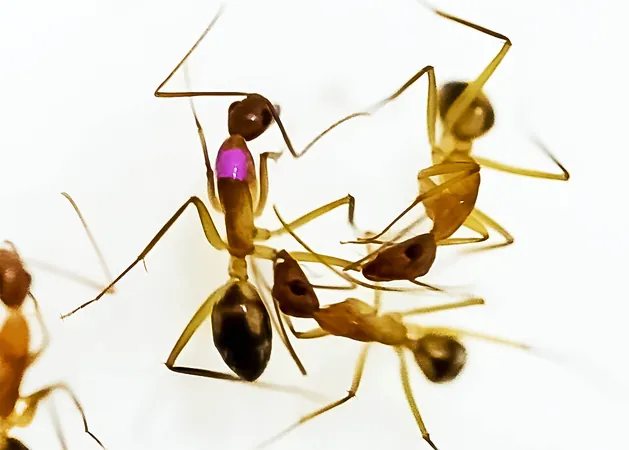
Have Ants Found a Way to Save Each Other? The Shocking Truth About Ant Surgeries!
2025-04-14
Author: Jessica Wong
Ants: The Unlikely Surgeons of the Insect World
Think only humans have the skills to perform life-saving surgeries? Think again! New research reveals that certain ants, particularly Florida carpenter ants, are engaging in what can only be described as their version of medical treatment.
The Science Behind Ant Surgeries
A groundbreaking study in Current Biology showcases how these tiny creatures tackle serious injuries among their fellow ants. Faced with severe wounds, these ants can choose to either clean the injury or go as far as to amputate the limb, effectively saving the ant's life. It's an astonishing revelation that challenges our understanding of insect behavior.
Surgical Precision: How Ants Make Decisions
Dr. Erik Frank from the University of Würzburg, who's at the forefront of this research, explains that the decision to operate hinges on potential infection risks and the extent of the injury. Each ant seems to carry out a careful assessment before determining the best treatment method, demonstrating an unexpected level of intelligence.
Inside Ant Amputations: A Unique Discovery
What sets these ants apart is their ability to perform systematic amputations on each other—a feat previously thought to be exclusive to humans and a few other species. In one section of this study, it was found that femur injuries were almost always followed by amputation, and these cases had an astonishing survival rate of about 90-95%! For less severe tibia injuries, simply cleaning still gave them a 75% survival chance.
Understanding Florida Carpenter Ants: The Basics
Camponotus floridanus, better known as the Florida carpenter ant, is prevalent in Florida's ecosystems. Unlike their wood-chewing cousins, they prefer to occupy existing cavities like rotting wood or tree hollows, and they are not shy about foraging for food on warm evenings.
A Unique Social Structure and Medical System
These ants live in vast colonies with thousands of individuals, each assigned a specific role from foragers to caretakers. Their complex social behavior enables them to communicate effectively, making it feasible for them to execute wound care and surgical procedures within their colony.
Ants Outperforming Nature's Odds?
Could this medical behavior be innate? Yes! Researchers are looking into whether similar surgical strategies exist in other ant species. This study opens up a plethora of questions about pain perception and cooperation in these creatures.
What Lies Ahead in Ant Medical Research?
As experts delve deeper, they hope to uncover whether other species without specialized antimicrobial glands also perform these life-saving amputations. The intricate dynamics of these behaviors suggest a remarkable level of cooperation and innate skill among ants.
In conclusion, the study of Florida carpenter ants acts as a window into a complex world where even the smallest creatures exhibit extraordinary capabilities. What will researchers discover next in the realm of social insects?

 Brasil (PT)
Brasil (PT)
 Canada (EN)
Canada (EN)
 Chile (ES)
Chile (ES)
 Česko (CS)
Česko (CS)
 대한민국 (KO)
대한민국 (KO)
 España (ES)
España (ES)
 France (FR)
France (FR)
 Hong Kong (EN)
Hong Kong (EN)
 Italia (IT)
Italia (IT)
 日本 (JA)
日本 (JA)
 Magyarország (HU)
Magyarország (HU)
 Norge (NO)
Norge (NO)
 Polska (PL)
Polska (PL)
 Schweiz (DE)
Schweiz (DE)
 Singapore (EN)
Singapore (EN)
 Sverige (SV)
Sverige (SV)
 Suomi (FI)
Suomi (FI)
 Türkiye (TR)
Türkiye (TR)
 الإمارات العربية المتحدة (AR)
الإمارات العربية المتحدة (AR)